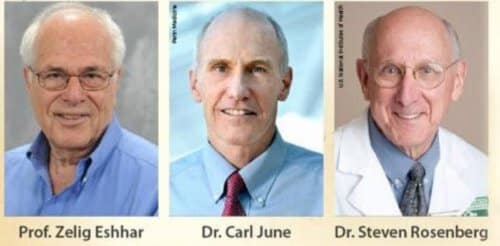In the reasons for the award committee, it was stated that Prof. Ashhar, Dr. Steven Rosenberg and Dr. Carl John focus on discovering molecular mechanisms of disease development, which can be used to develop new diagnostic, therapeutic and preventive tools for the benefit of humanity

Future time dimension: molecular medicine: This field bridges the gap between basic science and medical practice, and focuses on discovering molecular mechanisms of disease development, which can be used to develop new diagnostic, therapeutic and preventive tools for the benefit of humanity.
Prof. Zelig Ashchar, The director of immunological research at the Tel Aviv Medical Center named Sorasky (Ichilov), professor emeritus in the department of immunology at the Weizmann Institute of Science, and winner of the Israel Prize for Life Sciences for 2015. Ashhar is an expert in genetic engineering of T cells, and is one of the founders of the clinical application of technology CAR-T which acts against cancer cells. The award is given to him for his groundbreaking research that led to the development of dozens of medical treatments based on the revolution he led in editing T cells so that they attack cancerous tumors, and for laying the foundations, together with Dr. Steven Rosenberg, for the clinical application of this technology to fight cancer.
Dr. Steven Rosenberg, Director of the Department of Surgery at the National Cancer Institute in Bethesda, Maryland. Rosenberg was the first to develop effective immunological and gene-based therapies for patients with advanced cancer, and the first to successfully inject genetically modified genes into humans as a treatment for various diseases. His recent research on genetically modified lymphocytes led to a complete and lasting remission of cancer in patients suffering from melanoma, sarcoma, and lymphoma. The award is given to him for his various researches and the development of the T-cell immune stimulation treatment that led to the complete retreat of cancer in humans, for his discoveries that led to the first immunotherapy treatment for cancer, for his ongoing efforts to develop additional treatments, and for his unique way of translating basic science into medical practice.
Dr. Carl John, Professor of Immunotherapy in the Department of Pathology and Laboratory Medicine, Director of the Center for Cellular Immunotherapy, and Director of the Parker Cancer Immunotherapy Institute at the Perlman School of Medicine, University of Pennsylvania. John directs a research laboratory examining mechanisms of lymphocyte activation in the context of immune resistance and tailored immunotherapy for cancer and chronic infection. The research team led by him developed a treatment for patients with chronic lymphocytic leukemia, with the help of genetic engineering of T cells, which is now used to treat children suffering from acute lymphocytic leukemia. The award is given to him for innovation in CAR-T cell engineering and the development of treatments that help patients with advanced leukemia and lymphoma; for his ongoing efforts to implement CAR-T cell immunotherapy in children with cancer; and on the engineering of the next generation of CAR-T cells for widespread therapeutic use.
More of the topic in Hayadan:

2 תגובות
Thanks. Typos happen.
Contrary to what is written in the title, they "focus" on discovering molecular mechanisms. not dwarfed.